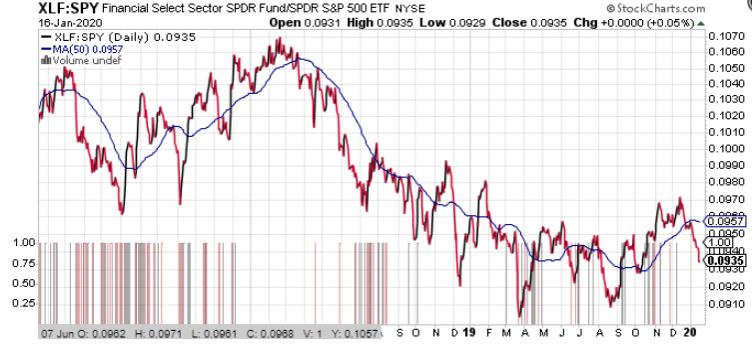Equity trading in the US has been a one-way trend, hitting fresh all-time highs in January. This follows a robust 28% return the benchmark S&P 500 index notched up in 2019. Despite the great run in stock prices most of the gains were in the technology space.
Nearly 25% of the large cap index is now made up of stocks including Apple, Microsoft, Facebook, Alphabet and Amazon. The question is where different sectors like financials can regain their mojo has, they have underperformed the broader market for the past 2-years.
Since hitting a high in relative value in September in 2018, the financial sectors have underperformed the broader market.
 XLF and S&P 500 SPY ETF ratio
XLF and S&P 500 SPY ETF ratio
The ratio between the XLF (financial sectors ETF) and the S&P 500 SPY ETF has declined by nearly 15% since hitting a multiyear high in September of 2018. Financials used to be the largest section of the S&P 500 index and used to be a driver behind the movement in prices.
Heavy regulation that has recently been lifted and a flat interest rate curve, have eroded bank earnings. Q4 earnings are showing that the banks are taking advantage of volatile capital markets notching up strong gains in fixed income and equity trading.
J.P Morgan Chase Beats Driven by Trading Gains
During the 3rd week of January, the financials kicked off the earnings season with robust gains from some of the large money-center banks. It started with JP Morgan reporting earnings and revenue that beat expectations driven by strong rebound in trading revenue at the end of 2019.
JP Morgan, which is one of the United States largest banks, reported that Q4 profit rose 21% to $8.52 billion, or $2.57 a share, compared with the $2.35 estimate. The company reported that managed revenue climbed 9% to $29.2 billion, compared with the $27.94 billion estimate.
The company saw huge profit in the investment bank which climbed 48% to $2.9 billion, mainly on trading results. Bond trading revenue surged 86% to $3.4 billion, exceeding the $2.61 billion estimate by roughly $800 million, as fixed-income desks cashed in. Stock traders posted a 15% increase in revenue to $1.5 billion, compared with the $1.37 billion estimate.
Robust gains elsewhere
Following JP Morgan, other financial institutions reported robust gains. Morgan Stanley saw its stock price surge after the company reported that earnings 2019 were $10.9 billion, beating expectations of $9.8 billion and setting a record for the 85-year-old investment bank.
Bank of America also hit the cover off the ball. The company reported that Q4 earnings were $7 billion, a 4% decline from a year earlier. But earnings per share were $0.74 an unexpected 6% increase, helped by a reduction in outstanding shares. That exceeded the $0.68 estimate. Revenue fell 1% to $22.5 billion, edging out the $22.35 billion estimate.
Despite robust results, financials have yet to begin to accelerate in performance relative to the broader markets. While there are undervalued relative to the broader indices, there is the potential for some catch up in 2020.
____________________________________________________________
Interesting related article: “What does the word ‘share’ mean?“

